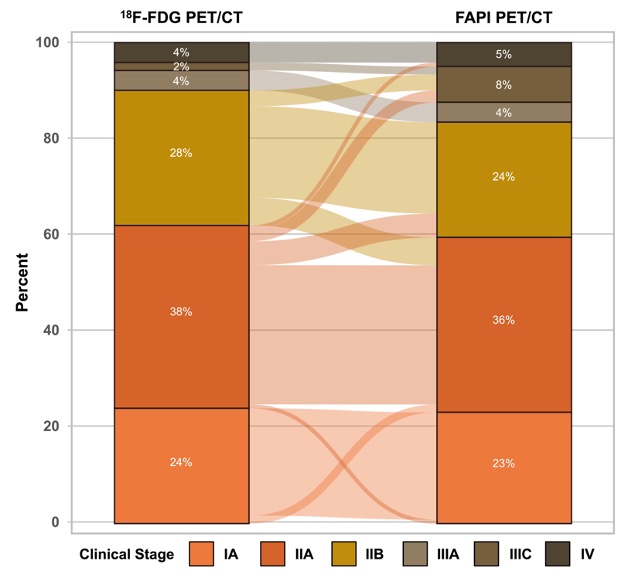FAPI PET/CT Improves Staging of Newly Diagnosed Breast Cancer
Posted on 08 Jul 2024
18F-FDG PET/CT is commonly employed for staging breast cancer but faces challenges such as false positives in inflammatory breast lesions and reduced sensitivity in certain breast cancer subtypes. Earlier small-scale retrospective studies have indicated that 68Ga-FAPI may surpass 18F-FDG PET/CT in detecting primary tumors and metastases in breast cancer patients due to its higher sensitivity. Now, a new comparative analysis between FAPI and 18F-FDG PET/CT for the systemic staging of newly diagnosed breast cancer has demonstrated that FAPI PET/CT offers more accurate staging. Notably, nearly 20% of patients had their clinical stage revised based on FAPI PET/CT findings, highlighting its potential benefits and efficacy in clinical settings.
The study by researchers at Peking Union Medical College Hospital (Beijing, China) included a total of 121 patients newly diagnosed with breast cancer. All participants underwent 18F-FDG imaging, and of these, 53 were also imaged using 68Ga-FAPI-04 PET/CT, while another 68 underwent A118F-FAPI-04 PET/CT. Lesions were considered positive if their uptake was higher than the surrounding tissue. The TNM clinical stage was assessed from both 18F-FDG and FAPI PET/CT images based on criteria from the American Joint Committee on Cancer Staging Manual. FAPI led to a restaging of 19.8% of patients when compared with stages determined by 18F-FDG PET/CT. The study also found that treatment plans were enhanced for six patients following the discovery of additional bone lesions and internal mammary lymph nodes. Notably, FAPI PET/CT identified a higher stage in 21.7% of patients initially classified as stage IIA by 18F-FDG PET/CT. Researchers suggest that patients with stage IIA breast cancer should consider undergoing systemic staging with FAPI PET/CT at the time of initial diagnosis.

“There is currently a lack of evidence on the efficacy of FAPI PET/CT, especially in large sample cohorts. Our study sought to add to the literature by assessing FAPI PET/CT for the systemic staging of newly diagnosed breast cancer compared with 18F-FDG PET/CT,” said Zhixin Hao, MD, a nuclear medicine physician at Peking Union Medical College Hospital. “This study is significant as it has the potential to advance personalized treatment strategies for breast cancer patients. FAPI PET/CT for the initial staging of breast cancer has the potential to reduce unnecessary treatments and improve patient outcomes.”
Related Links:
Peking Union Medical College Hospital














